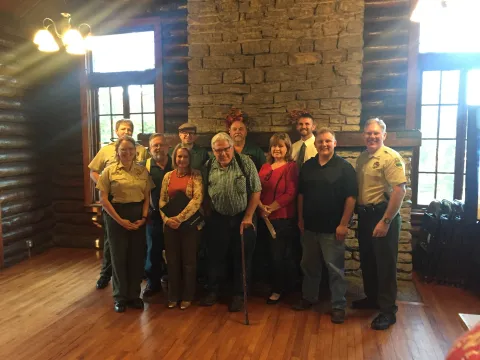Union County’s Forgotten Treasure

The Recreation Hall at Big Ridge State Parked was packed on the 18th of October as concerned members of the community provided input to the Park’s Business and Management Plan. This plan is updated every five years and it provides the framework for future improvements to the park. Recognizing that place based economic investment is fundamental to the county's economic future, individuals attending Thursday evening’s meeting stressed that one of the most important investments in Union County to bring jobs and prosperity is Big Ridge State Park.
Attendees noted the importance of retaining the existing structures, built in 1936 by the Civilian Conservation Corps, to maintain the existing charm and design of that time in a designated historic portion of the approximately 4,000 acre park. They also stressed the need to continue improving the existing structures with modern amenities such as air conditioning, heat, broadband, restroom facilities, etc.
In addition to suggesting these short-term improvements, attendees discussed long-term investments to include 150 additional campsites, overnight lodging accommodations, a restaurant, conference center and corporate retreat, a 200 slip marina and 50 additional modern lakefront cabins along the 30 miles of Norris Lake shoreline, horseback and mountain bike trails, and a music amphitheater. A summary of the input provided is attached and you are encouraged to use this as a guide to provide similar suggestions or additional input at https://stateoftennessee.formstack.com/forms/tspbusiness_plans_comment. The State will only accept comments through the end of November and every county resident is encouraged to submit input and forward this article to friends that will also provide comment. Only by working as a community can we bring state investment to Union County.
Big Ridge Park Manager Keith Montgomery and his staff were commended for recent improvements to the Park, reversing years of neglect and declining park visitation. Prior to Ranger Montgomery’s arrival, park visitation had decreased by 45%. In 2016, visitation numbers over 1.6 million made Big Ridge State Park the third most visited State Park in Tennessee.
Using economic impact estimates from the 2009 Economic Impact study of Tennessee’s State Parks by the University of Tennessee, the decrease in park utilization prior to Ranger Montgomery’s arrival resulted in an approximate direct revenue loss of $67 million with a corresponding economic multiplier loss of $142 million to the local, regional and state economy. Most of this loss was to local Union County businesses.
According to 4th District Commissioner Danny Cooke, “Big Ridge State Park can be a spark that ignites the economy in Union County.” Big Ridge State Park is arguably the most important place based economic asset in the County and key to growing the county's tourism industry. Tennessee’s tourism industry is our state’s No. 2 industry, contributing $19.3 billion in economic impact in 2017 and contributing more than $1.7 billion in state and local sales tax revenue. Union County is currently ranked #86 out of 95 counties by Economic Impact of Tourism, generating only $6.89 million in direct tourism expenditures in 2017. This is in spite of being home to Big Ridge State Park, Norris Lake and Chuck Swan Wildlife Management Area.
Commissioner Cooke noted that Tennessee State Parks have a significant impact on Tennessee’s economy. State Parks create direct and indirect employment in many rural areas where jobs are needed most and options for significant private sector investment and growth may be limited. In 2009, the University of Tennessee estimated the economic impact of state parks resulted in over $725.2 million annually in direct expenditures by state park visitors. The average expenditure per trip of Tennessee State Park visitors was $128.64. For every direct dollar spent by visitors, an additional $1.11 of economic activity was generated in the state. Direct and indirect expenditures therefore exceeded $1.5 billion in total industry output.
The economic success of Big Ridge State Park is reliant on investment in services and amenities. Such investments will lead both to more visitors and to higher per capita expenditures per visitor. The result of such investment will be higher revenues to the state and more jobs and income to residents in Union County.
The Tennessee 2020 Vision for Parks, People & Landscapes highlighted the need of rural regions for help in harnessing their recreation assets for economic development. According to this report, Tennessee’s rural regions can gain significant economic benefits from their rich heritage of natural, historic, and cultural resources if they view them as valuable economic assets. The report noted that Intergovernmental partnership with our state agencies including Economic and Community Development and Tourist Development is required to harness these recreation assets for economic development.
Submit your input at the link above and help bring needed state investment in Union County.
- Log in to post comments